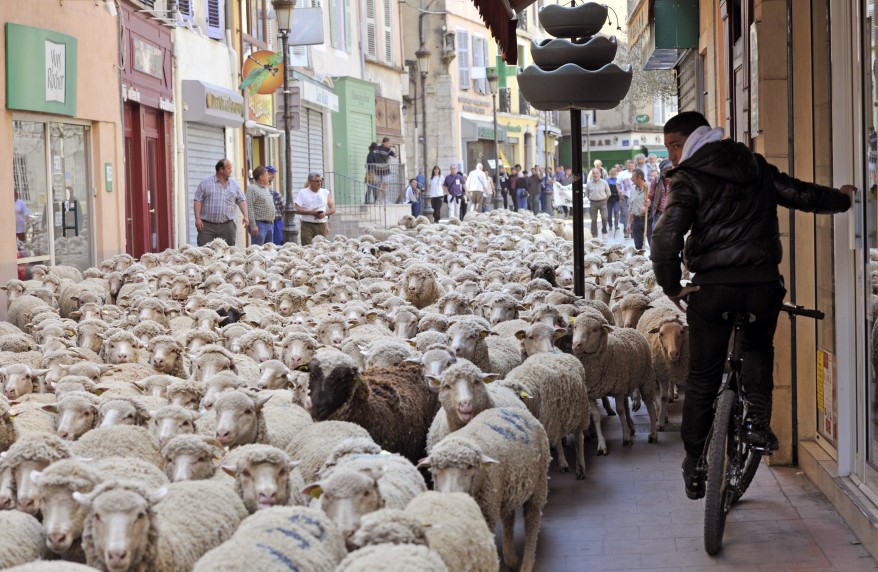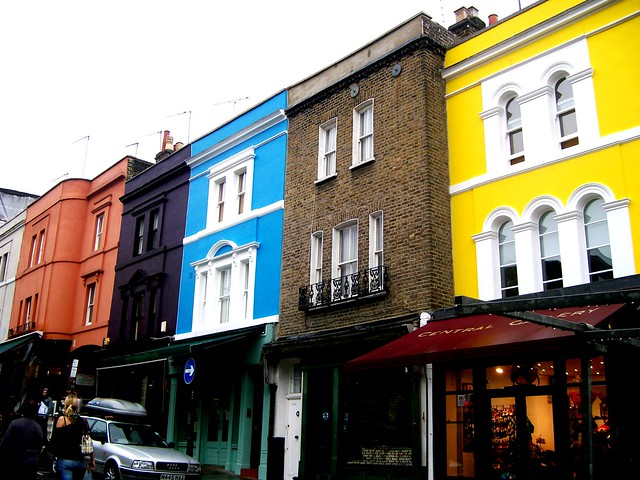#19. AVOIDING A TRAGEDY OF THE COMMONS. The current transport situation in London is a ‘tragedy of the commons’. To understand what this crucial phrase means, a little explanation is necessary.
In a famous essay published in 1968, the biologist Garett Hardin coined the phrase ‘tragedy of the commons’ in order to describe the process by which shared pastures are prone to overgrazing. The problem, he noted, is that any farmer using common land perceives that he can benefit by allowing his animals to eat as much of the vegetation as possible (and by grazing as many animals as possible). But soon the land’s limited resources are at risk of depletion, leaving nothing for anyone. This is the worst outcome for the farmers, yet each of them can be led to contributing to its eventuality by a compelling chain of reasoning.
Imagine you are a farmer with a decision to make about whether or not to restrict your animals’ grazing. If you don’t restrict them, you stand to gain, whatever everyone else does: if everybody else restricts their animals and you don’t, you’ll get a bigger share of the land’s resources; and if nobody restricts their animals and you don’t, you’ll still get a bigger share of the land’s resources than you would have done through exercising restraint. The ‘tragedy’ occurs when every farmer makes this calculation, so that the land, and each and every one of them, ends up worse off than if the commons hadn’t been exploited.
Hardin’s description isn’t just applicable to farmers. All kinds of groups can get locked into a permanently suboptimal state of functioning whenever their members reckon that it’s in their interests to succumb to the temptation of anti-social behaviour.
London’s transport situation provides another example. Every day millions of Londoners use their cars for commuting, doing the shopping, taking the kids to and from school, and numerous other errands – the capital is a big place, and there’s no time to waste. But it’s not that big, certainly not enough to contain all those cars. Rather than cruising round an airfield or a Swiss mountain bend – what people imagine they’re signing up for when buying a car – driving in London is more like moving furniture in a bedsit. The traffic is jammed in a frenzy of beeping, road rage, revving and fumes, with hardly a parking space in site, while crack-squads of commission-paid traffic wardens stalk the pavements slapping £120 fines on windscreens. Dystopia is putting it mildly.
Driving in London (and most other urban spaces) is tragic insofar as road users calculate that, whatever everyone else does, using the car is a better option than walking or cycling. The reckoning is: if the minority drives then it’s quicker and better to take the car; and if the majority drives then it’s still better to take the car because congested streets are too terrifying and polluted for cycling or walking on. The upshot is the furious gridlock familiar to anyone who has driven on, say, the North Circular in rush-hour.
And, worse, it’s not just the participants in the tragedy who are involved. For one thing, everyone in London is affected negatively. Because car-filled streets are unpleasant and dangerous, especially for vulnerable residents such as children and senior citizens, wider society ends up paying for the consumer habit of one segment. Cars are also less sociable: they seclude their occupants behind windscreens, thus decreasing the sense of community and making everyone worse off.
Another especially bad thing about the tragedy of the commons car drivers cause is that it enables a segment of society to devilishly benefit from the tragic behavior of others. Specifically, producers of cars are the beneficiaries, making money on the back of that compelling chain of reasoning which leads Londoners to buy a car despite the collective harms. As a society we are therefore compromised doubly: our suffering is a cohort’s gain.
How do we break out of London’s transportation tragedy of the commons? An obvious answer is to get more people cycling. This could be achieved in part by convincing vast numbers of Londoners of the health, financial and well-being benefits of cycling, but most importantly by insisting that the traffic on the capital’s streets only seems to be too dangerous for cycling. In recent years, many cyclists have woken up to the fact that cycling is perfectly safe if you take care and ride sensibly (don’t undertake vehicles turning left, for instance). The problem is, these cyclists are very much in the minority. Most Londoners remain adamant that the traffic makes it too dangerous to cycle, so they take their cars instead. And so the tragedy persists. Traffic is the fear of traffic incarnate.
Simon Parker’s London Cycle Map offers a realistic way of side-stepping this tragedy of the commons. His plan shows how we could install road markings and signs on the streets of the London Cycle Network (which are generally safer and quieter), enabling would-be cyclists to get from anywhere to anywhere in the capital by following just a few coloured routes, like on the Tube. This would remove the fear-factor associated with cycling, because the terrifying traffic on the capital’s major roads would mostly be an irrelevance on the routes of the London Cycle Map.
After experiencing the benefits of cycling using Parker’s London Cycle Map, millions of Londoners would soon lose the temptation to slip back into their car driving ways. But, even if they did slip back occasionally, this wouldn’t impact on others’ decision whether or not to cycle. The routes of the London Cycle Map would mostly be insulated from the dynamic of fear which causes cars to proliferate in urban spaces. (In contrast, the LCC's Go Dutch campaign is promising only to insulate a few segments of main road, which would still leave cyclists exposed to fear for most of their journeys.)
Tragedies of the commons can be solved only when all the participants or their representatives agree to take steps to avoid the tragedy. Farmers, for instance, can co-operate to keep land sustainable, or – in another example – fishermen can co-operate to avoid depleting fisheries.
In order to solve the transport tragedy of the commons in London we need the authorities to co-operate, by signing and marking the thousands of kilometres of safe cycling streets making up the London Cycle Network with the routes featured on Parker’s London Cycle Map. Alas, our political leaders and civil servants don’t seem to be interested. So the rest of us will have to stop being sheep, and start demanding the solution.
www.petition.co.uk/london-cycle-map-campaign










